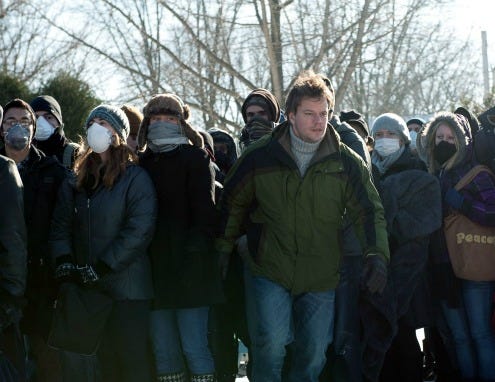Contagion

"Contagion" is a gripping movie, but the things that make it good also limit how good it can be.
It's an attempt by director Steven Soderbergh, screenwriter Scott Z. Burns and a large ensemble cast to portray the outbreak of a worldwide epidemic in a realistic way rather than through a handful of descriptive characters and a melodramatic story arc. At this, it succeeds completely.
So instead of, say, a small group of survivors hacking their way through the remnants of a world turned upside down — "28 Days Later ..." and "I Am Legend" are a couple of examples — Soderbergh's film is a docudrama that covers dozens of intersecting stories. This roving-eye approach allows us to observe as the populace grows uptight and scared, the government response becomes more and more sclerotic, and the center falls apart.
It's a sobering experience, watching heroic doctors and scientists racing against the clock to come up with a vaccine before the mathematical certainty of the disease's spread wipes the human race out. We also see the ugly side of humanity that reacts out of fear or avarice to exploit the situation — such as Alan Krumwiede, a blogger played by Jude Law who's convinced the government is controlling the situation to maximize pharmaceutical companies' profits.
(Great throwaway line from one of his targets: "Blogging isn't writing. It's graffiti with punctuation!")
But as engaging as this method of storytelling is on an intellectual level, the film often fails to grab us emotionally. Certain well-played scenes have power — such as when one of the central characters, a crusading scientist working to solve the problem, becomes sick — while others just sort of lay themselves out there, heavy on information but light on visceral impact.
And there's a few too many "science montages" of test tubes spinning in a centrifuge, specimens sealed in plastic and people hobbling around in funny-looking environmental suits. Those scenes practically needed their own theme music.
I do respect the movie for its willingness to kill off characters without regard to the status of the actor who's playing them. Some famous faces end up thrown in a pit or on an autopsy table — the latter being incredibly life-like and gruesome.
Likewise, some people who at first seem peripheral to the story, almost background characters, subtly nudge to the fore and become critical players. This "e pluribus unum" approach gives the film a realistic authenticity.
Matt Damon plays Mitch Emhoff, an unemployed house-husband whose wife, Beth (Gwyneth Paltrow), is one of the earliest people to contract the bug, later dubbed MEV-1. Only a partial list of other players includes Kate Winslet as an investigator with the Center for Disease Control, Laurence Fishburne as her do-gooder boss, Marion Cotillard as a World Health Organization expert, Chin Han as a Hong Kong official, Elliot Gould as a private researcher called in to help out and Jennifer Ehle as a government researcher.
Interestingly, the movie has a few riffs on how such an outbreak might play out on the political front that tweak both the left and the right ends of the spectrum. There's some heartless corporations (are there any other kind in the movies?) looking to cash in, and at one point, the nurses' union goes on strike, leaving dying patients in the lurch. Not to mention miles of government red tape to be sheared through.
Sounds crazy, but don't forget that part of the reason behind the slow response to Hurricane Katrina was that volunteer emergency workers were forced to sit through sexual harassment training before being sent to the Gulf.
"Contagion" uses an extreme situation to show us the breadth of our ragged humanity, its grace and its grubby failings. I just wish the movie could have been able to connect with hearts as well as it does heads.
4 Yaps

